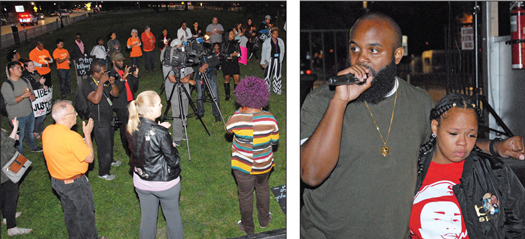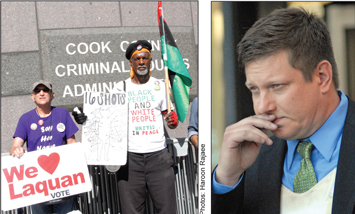Jury selected, opening statements begin in cop trial
By by Bryan Crawford -Contributing Writer- | Last updated: Sep 18, 2018 - 3:48:30 PMWhat's your opinion on this article?

The first degree murder trial of Chicago police officer Jason Van Dyke has drawn national media attention. Mr. Van
Dyke is on trial for first degree murder in the 2014 shooting death of 17-year-old LaQuan McDonald. His death sparked
protests around the city.
|
CHICAGO—In what many are describing as one of the most important and closely monitored court cases in Chicago history, opening statements began in the trial of Chicago Police Officer Jason Van Dyke who was charged with murdering 17-year-old LaQuan McDonald (See Final Call Vol. 37, No. 50).
Opening statements began Sept. 17 and in one important and key ruling that day, Judge Vincent Gaughan denied the defense’s motion to move the trial outside of Cook County. Off. Van Dyke is facing two counts of first-degree murder, one count of official misconduct and 16 counts of aggravated battery. LaQuan was shot 16 times.
Prosecutors charged that race was a factor in the fatal encounter. Off. Van Dyke is White, LaQuan is Black. Defense lawyers for Off. Van Dyke called the October 14, 2014 shooting a “tragedy” but not “murder.” With a full week of testimonies slated for the third week in court, there is tension, speculation and uncertainty among many of Chicago’s Black residents.

(l) Protesters have gathered outside the courthouse in Chicago where the trial is taking place. A jury has been selected in what has been a closely monitored case. (r) Chicago police officer Jason Van Dyke
|
Protests outside court in the days before opening statements were a bit more subdued and less intense than the Sept. 5 opening day as the task of choosing 12 people to sit on the jury to hear the details of this case ramped up.
In the last piece of business to attend to the week of September 9 was the decision by Mr. Van Dyke and his attorneys on whether or not he would have a jury trial, or a bench trial heard only by a judge. In Illinois, a defendant has the option to choose between the two, even after a jury has been selected and sworn in. Mr. Van Dyke’s attorneys opted for a trial by jury, despite the fact that bench trials have led to no convictions of police officers charged with either manslaughter or murder.
Jury selection began in earnest on Sept. 12 with five more jurors being sworn in. Two potential jurors were dismissed because one stated on his questionnaire that he has talked about the case extensively with friends who were members of the Chicago Police Department, and the other because he’d recently applied to become a Chicago police officer, and it was revealed that he was much further along in the interview process than was originally stated.
The lone Black juror selected was a Black woman who works for FedEx. She stated that she had seen the video, thought it was “horrific,” but had formed no opinion on it. The second juror selected that day was a White man who stated that he was a supporter of the police and the Second Amendment. The third juror selected the following day was another Latina woman, the fourth was a White woman who admitted to knowing Judge Gaughan and his family personally, and the fifth juror seated was another Latina woman in training to become a Chicago police officer, who said she had also not seen the shooting video.
By the end of the day on Sept. 12, 10 jurors had been selected, and given the demographics of those selected, it raised the question of race being a deciding factor on who sits and who was dismissed.
Prosecutors filed a motion stating they felt Van Dyke’s defense team was purposely trying to keep Black people off the jury. On Sept. 11, Mr. Van Dyke’s attorneys had dismissed two Black jurors and attempted to get the Black female FedEx employee dismissed as well, but Judge Gaughan denied the request and she was seated.
Outside the courtroom, LaQuan McDonald’s great uncle, Rev. Marvin Hunter of Grace Memorial Baptist Church said of the jury being comprised of four White women, two White men, three Latinas and one Black woman, “The defense has skillfully done what they set out to do. However, I would have liked to have seen more African Americans [selected]. But I believe that the citizenry of the County of Cook, can bring about a fair decision in this instance because the facts are there. And if the prosecution is allowed to present the facts of this case, I believe that any jury, no matter what race they are, can bring about the right decision.”
The third day of jury selection, Sept. 13, the last two jurors and the selection of five alternates began. Juror No. 11 was a White man whose listed occupation was nuclear engineer, and juror No. 12 was another White woman, bringing the complete racial composition of the Jason Van Dyke jury to seven Whites, three Latinas, one Asian and one Black. Juries are typically supposed to reflect the racial demographics of the county, which in Chicago is made up of 42.3 percent White residents, 25 percent Hispanic, 24 percent Black and seven percent Asian.
Early on in week two, in addition to questioning jurors in open court, one of Mr. Van Dyke’s defense attorneys, Dan Herbert, filed a motion attempting to have the trial moved outside of Cook County, arguing that protestors outside the courthouse could impact jurors’ ability to be impartial, make it difficult for their client to receive a fair trial, and could be prone to rioting if Van Dyke was acquitted.
“It is abundantly clear that the community will riot if Van Dyke is not found guilty,” his lawyers said in a filing. “It is impossible that a juror will vote to acquit knowing that they must return to the neighborhoods which have promised violence in the event of a not guilty verdict. … These jurors understand that when they return home after a verdict, there will not be barricades in front of their homes. There will not be dozens of armed law enforcement officers present. They will be alone, vulnerable and no doubt terrified.”
It was that last point that community activist Will Calloway objected to. As one of the co-organizers of the Van Dyke protests—who helped secure a demonstration permit—at “Justice for LaQuan McDonald” rallies, Mr. Calloway was once again forced to reiterate that those making their voices heard outside the courthouse had no plans on becoming violent and that their assembly, while having pointed messages, was peaceful.
“I read some misleading and incorrect statements by the [Van Dyke] defense attorneys, that I’m trying to promote unnecessary hysteria,” Mr. Calloway said. “As I’ve said before and will continue to say, we are a nonviolent movement, we are peaceful demonstrators and we will continue to be peaceful demonstrators. I’ve never said, and no one in our coalition has ever said anything about inciting a riot or promoting a riot. We would never say anything like that. We are a nonviolent movement, and when protestors come out or demonstrators come out during the trial, or after the verdict is read, we’re asking everybody to be nonviolent.”
In addition to the completion of the jury selection phase of the trial, Kevin Graham, president of the Fraternal Order of Police, held a press conference outside the courthouse supporting Mr. Van Dyke.
“For more than a year, there has been an image that has been image going out about the night that Jason Van Dyke and LaQuan McDonald had an altercation. Mr. Van Dyke went after the offender with a knife who was threatening bodily harm. Today we’re here because Mr. Van Dyke is facing first-degree murder charges. Mr. Van Dyke did not wake up that morning, premeditated thinking he was going to kill anyone,” he said.
“I think that Mr. Van Dyke is not a bad person. I know for a fact that he prays every day. I think he is a good person and he is facing an almost insurmountable amount of public pressure from people who have not heard one piece of the evidence. … I think it’s important for everyone to know where the FOP stands and why we have concerns,” added Mr. Graham.
Around the country, since 2005, of the 94 officers accused of an on-duty shooting and charged with manslaughter or murder and faced a jury, 22 have been acquitted, 16 have plead guilty and 17 have been convicted. Not one has ever been found guilty by a judge, with nine being acquitted and four having their charges dismissed.
(Final Call staff contributed to this report.)
INSIDE STORIES AND REVIEWS
-
-
About Harriett ... and the Negro Hollywood Road Show
By Rabiah Muhammad, Guest Columnist » Full Story -
Skepticism greets Jay-Z, NFL talk of inspiring change
By Bryan 18X Crawford and Richard B. Muhammad The Final Call Newspaper @TheFinalCall » Full Story -
The painful problem of Black girls and suicide
By Charlene Muhammad -National Correspondent- » Full Story -
Exploitation of Innocence - Report: Perceptions, policies hurting Black girls
By Charlene Muhammad -National Correspondent- » Full Story -
Big Ballin: Big ideas fuel a father’s Big Baller Brand and brash business sense
By Bryan Crawford -Contributing Writer- » Full Story






 Click Here Stay Connected!
Click Here Stay Connected!








